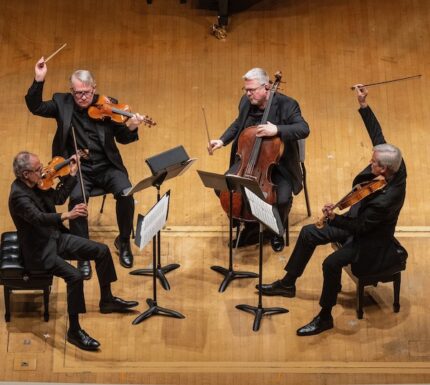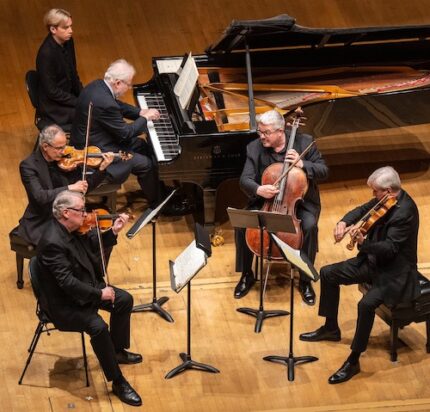Emerson Quartet bids an elegiac farewell in final Chicago concert

The Emerson String Quartet is disbanding in October, at the close of its 47th season, and said a final goodbye to Chicago audiences Sunday afternoon at Symphony Center.
Initially formed as a student group at the Juilliard School in 1976, the Emersons have enjoyed a remarkably consistent roster. Violinists Eugene Drucker and Philip Setzer have been there since the beginning, and violist Lawrence Dutton has been in place since the group’s second year. David Finkel was cellist from 1979 until he retired ten years ago and was replaced with Paul Watkins, the sole major personnel change in the Emersons’ storied career.
Their final Chicago stand was a mixed and bittersweet reflection on a near half-century of music-making that is coming to a close.
The afternoon began with George Walker’s Lyric for Strings, originally the second movement of the composer’s String Quartet No. 1. The Emerson was one of the first big-time quartets to switch off first and second violins, and with Setzer sitting first they captured the intimate, narrative quality of Walker’s brief meditation, setting a tone of reflection.
This feeling was sustained in Shostakovich’s String Quartet No. 12 in D-flat Major. Op. 133 was the first of the four late works in the genre that the composer wrote following his first heart attack in 1966. Mortality looms over these scores, and is felt in the uneasy tension between wandering 12-tone rows and a tonic D-flat Major in the opening Moderato, where the Emerson plumbed this existentially unsettled feeling.
The ensuing and much more substantial Allegretto-Adagio was less convincing. While not necessarily programmatic, it is clear that something truly devastating occurs in the first section of this movement, and Sunday’s performance was too restrained to make the music’s violence believable. They charted a surer course in the muted lament that follows, though its desolate passages are more effective when preceded by genuine havoc. Drucker (at first violin) delivered bitterly outraged solo pizzicatos when called for, and ultimately the four found the force that had been wanting earlier when driving the work to its sneering major-key conclusion.

For the second half the Emerson was joined by Emanuel Ax for Dvořák’s Piano Quintet in A Major, Op. 81. Before they began, Setzer (again first violin) joked, “We have no idea who this pianist is.” He went on to say he and Ax had first played in recital together something like 50 years ago. The ensuing performance had a moving quality as one reflected on these relationships that have lasted the better part of a lifetime.
Ax created a supple bed of sound for Watkins’ opening cello solo, and the five men charted the vigorous ebb and flow of Dvořák’s melodic invention in the Allegro, ma non tanto. Ax was an exceptionally sensitive collaborator throughout, and with his colleagues spun the vignettes of the episodic Dumka in a bardic style.
As the performance went on there were more and more pitchy moments from both violinists, though this did not overly dampen the charging gusto of the Scherzo (Furiant), which segued almost directly into the Finale. The effervescence of this last movement really feels like a prelude to the hymn-like coda, and such was the case Sunday. Setzer’s limpid violin melody felt like a leave-taking. There was palpable emotion as time stood still for a moment, before the five men bounded to the double bar and an affectionate standing ovation.
That ovation ultimately brought Ax and the Emerson out for an encore of the Andante, un poco adagio from Brahms’ Piano Quintet in F Minor. Here the five were collectively attuned to the contours of Brahms’ elegiac writing, and ended the movement with a truly perfect diminuendo, the last a Chicago audience would enjoy from them.
Posted in Performances


